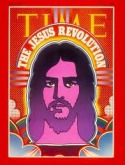 Ways The Church Might Change: Point 10
Ways The Church Might Change: Point 10
[In a previous blog I have outlined 10 possible changes the Church may face in the future. This is point 10 in the series: God has been reestablishing the evangelist, pastor, teacher, prophet, and apostle back into the Church. They are in the Church now! This generation has to be open to allowing the Holy Spirit to bring them together through submission and releasing one another to operate in their passions, callings, and voices to bring unity to the body of Christ and being effective.]
As you have seen throughout this series, I believe revival in the Church will come through relationships vertically with the Godhead and horizontally among believers while demanding total trust in the Spirit of Jesus Christ to lead the way. If you have read my series on metamorphosis, you would also know that I believe that the Church is in a time of transformation, a cocoon stage, where the current slow cumbersome caterpillar structure of the Church is being transformed into a complete different structure, a hard shelled resilient structure of a butterfly that will allow it to fly. The Church is in a period of change, but as members of the Church, the Priesthood of Believers, the Bride of Christ, are we willing to embrace these changes?
One of the changes that is occurring is the reestablishment of the five fold of Ephesians 4 back into the church as passions, gifts, points of view, and voices in individual believers to make them more Christ-like and bring unity within the Church that has not existed for the last 20 centuries.
 Every local Christian church needs an evangelistic passion to win the lost and proclaim the message, “You must be born again” of “the water and the spirit”. With revival is always a powerful movement of new believers in Jesus Christ. The evangelistic spirit is the spirit of birthing, and every local church needs that spirit in order to grow in number.
Every local Christian church needs an evangelistic passion to win the lost and proclaim the message, “You must be born again” of “the water and the spirit”. With revival is always a powerful movement of new believers in Jesus Christ. The evangelistic spirit is the spirit of birthing, and every local church needs that spirit in order to grow in number.
 Every local Christian church needs a pastoral, shepherding spirit that nurtures, cares, develops, equips, trains, and releases their believers towards ministry, “works of service”. The evangelist births, but the pastoral/shepherd nurtures these newborns through their spiritual childhood and adolescence to prepare, equip, and train them in Christ-like character development to release them to be able to stand and advance the kingdom of God as mature believers. The pastoral/shepherding spirit is the spirit of development, and every local church needs that spirit in order to grow in character in Christ-likeness.
Every local Christian church needs a pastoral, shepherding spirit that nurtures, cares, develops, equips, trains, and releases their believers towards ministry, “works of service”. The evangelist births, but the pastoral/shepherd nurtures these newborns through their spiritual childhood and adolescence to prepare, equip, and train them in Christ-like character development to release them to be able to stand and advance the kingdom of God as mature believers. The pastoral/shepherding spirit is the spirit of development, and every local church needs that spirit in order to grow in character in Christ-likeness.
 Every local Christian church needs the teaching spirit. The Word of God, the Bible, is the foundation of all that happens in the Church. Every Christian, without exception, needs someone to help them understand the Word of God for themselves through the tutorage of the Holy Spirit. Every Christian needs to memorize scripture, exercise the knowledge of knowing or recalling scripture, and bases everything they do upon the Word of God. The teaching spirit sets the foundation for the Church, so every local church needs that spirit in order to stand firm.
Every local Christian church needs the teaching spirit. The Word of God, the Bible, is the foundation of all that happens in the Church. Every Christian, without exception, needs someone to help them understand the Word of God for themselves through the tutorage of the Holy Spirit. Every Christian needs to memorize scripture, exercise the knowledge of knowing or recalling scripture, and bases everything they do upon the Word of God. The teaching spirit sets the foundation for the Church, so every local church needs that spirit in order to stand firm.
 Every local Christian church needs the prophetic spirit, the capability to hear the still small voice of the Holy Spirit for themselves, as well as being able to take the Logos Word, the written Word, the Bible, and make it the Rhema Word, the living Word. The 1st Century Church took the Logos Word, what today is known as the Old Testament, and made it the Rehma Word, the living word, as they lived out their new faith and recorded it, thus the New Testament. The prophetic spirit activates life into the Church, so every local church needs the prophetic spirit to move forward in living out their faith.
Every local Christian church needs the prophetic spirit, the capability to hear the still small voice of the Holy Spirit for themselves, as well as being able to take the Logos Word, the written Word, the Bible, and make it the Rhema Word, the living Word. The 1st Century Church took the Logos Word, what today is known as the Old Testament, and made it the Rehma Word, the living word, as they lived out their new faith and recorded it, thus the New Testament. The prophetic spirit activates life into the Church, so every local church needs the prophetic spirit to move forward in living out their faith.
 Every local Christian church needs the apostolic spirit, the ability to “see” what the Holy Spirit is doing and saying and be obedient to it, the ability to identify giftings in other believers and equip and train them in their Christian development, and the ability to release other believers in their gifting, their calling, their destiny in Jesus Christ. Instead of administrators in a business sense, the Church needs developers and investors in other Christian believers, people with spiritual parenting skills. The apostolic spirit brings unity, direction, harmony, and stability to the Church, so every local church needs the apostolic spirit for direction and over sight.
Every local Christian church needs the apostolic spirit, the ability to “see” what the Holy Spirit is doing and saying and be obedient to it, the ability to identify giftings in other believers and equip and train them in their Christian development, and the ability to release other believers in their gifting, their calling, their destiny in Jesus Christ. Instead of administrators in a business sense, the Church needs developers and investors in other Christian believers, people with spiritual parenting skills. The apostolic spirit brings unity, direction, harmony, and stability to the Church, so every local church needs the apostolic spirit for direction and over sight.
Now for the shocking conclusion: I believe all these spirits are already in people in your local congregation. The five fold is already present, seeking to be manifested right among yourself. All we must do is embrace the Holy Spirit to birth, develop, and release these passions, visions, and points of view among us, the believers in Jesus Christ, the Priesthood of Believers. They need to be “activated” among the laity in order to be effective. Clergy/laity labels must cease, so all believers in Jesus Christ can be empowered, developed, equipped, and released into their destiny in the kingdom of God. The key to the next revival is that it will touch “all” believers in Jesus Christ, not just the professionals, nor the old establish believers, nor the chosen few. It will be a massive world wide movement to remove the “spot and wrinkles” of the Bride, the Church, in preparation for the Groom, Jesus’ return. It will impact Church structure like no movement in history has, not even the Great Reformation. I prophesy that the way my great-grandchildren do Church as adults will look nothing like the pew sitting, hymn singing, pulpit preaching church services of my great-grandparents. Church, if we want REVIVAL, we must be prepared for change, and be open to what the Holy Spirit desires to lift the name of Jesus and establish the Kingdom of God over the entire earth! Revival, come!






















































































